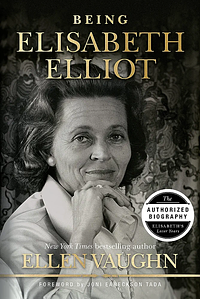You need to sign in or sign up before continuing.
Take a photo of a barcode or cover
48 reviews for:
Being Elisabeth Elliot: The Authorized Biography: Elisabeth's Later Years
Ellen Vaughn
48 reviews for:
Being Elisabeth Elliot: The Authorized Biography: Elisabeth's Later Years
Ellen Vaughn
emotional
hopeful
informative
inspiring
reflective
sad
medium-paced
inspiring
reflective
medium-paced
This non-fiction book offers a look into a life of unbelievable hardship. The cliche "there is always someone who has it worse than you" comes to mind. I have definitely stopped to count my blessings.
challenging
emotional
informative
inspiring
reflective
medium-paced
“Our hero of the faith was not a bronze statue, impervious to fissures; nor was she an airbrushed paragon of virtue, untested by the things that thwart and frustrate us all…but with any hero worth her weight, she would set people straight who idolized her, pointing them only to the hero who will never let them down, Jesus Christ” - Joni Eareckson Tada
Deeply moving. Lots of thoughts. Still processing. Joni says it better than I ever could.
Deeply moving. Lots of thoughts. Still processing. Joni says it better than I ever could.
challenging
emotional
hopeful
informative
inspiring
reflective
sad
medium-paced
Absolutely great biography. Elisabeth Elliot was a woman I look up to and admire greatly, but I love that the biographer didn’t just paint a perfect picture of her, but told of some of Elisabeth’s faults and foibles as well. No one is perfect, and it’s reassuring to read that even the Christian “greats” made mistakes too. This book was touching and relatable and inspiring. Highly recommended!
reflective
medium-paced
Love the honesty in this book, and the way it resists the urge to put a Christian hero on a pedestal. The goodness and righteousness of Jesus shines brighter when the flaws and sins of his people aren’t airbrushed away.
Being Elisabeth Elliot is a startling conclusion to the life story of a woman whom many of us have long counted as one of our heroes.
The first volume by Ellen Vaughn, Becoming Elisabeth Elliot, was gripping and even compelling. But there wasn't a lot that surprised or shocked me—other than the extent of the challenges of the relationship between Rachel Saint and Elisabeth—because I'd read Elisabeth's books Through Gates of Splendor and The Savage, My Kinsman, as well as The Journals of Jim Elliot and her daughter Valerie's book Devotedly.
However, Being Elisabeth Elliot had some plot twists and character flaws I didn't see coming.
There's always the potential to be walking into a field of landmines when you read the biography of someone whom you have revered and respected. After all, we don't have to look any further than the Old Testament to see that even a man after God's own heart has many mistakes and bad decisions in his past!
But as I processed the revelations in Being Elisabeth Elliot (spoiler alert: primarily Elisabeth's interactions with men, the origins of her relationship with Addison, and the darker side of Lars and their marriage) , I found myself wishing we'd heard more of these details in her own books and radio talks. What if she'd shared with us about some of her own temptations when she spoke of passion and purity? What if she would have told us of some red flags to watch out for as we measured the mark of a man? She truly spoke wisdom gained from experience—but I wish she had felt free to share a bit more of the context at times.
As the authorized biography, Being Elisabeth Elliot draws extensively from journals in private collections that other biographers have not had access to. I couldn't help but wonder if the journal entries might tend to present the more extreme heights and depths of emotion, as the private place Elisabeth put thoughts and feelings she didn't share with others. Thus, this biography might need to be read along with others to get a more complete picture of the life of Elisabeth Elliot.
One thing I found very interesting was how much commentary—historical and philosophical, as well as personal—Vaughn added to the story. This did help provide cultural and historical context. And the background as it related to missions (particularly in Becoming) showed how much Elisabeth was a product of her times—and yet how much she bucked the traditional evangelical norms of the day.
Vaughn is indisputably a brilliant writer. It was somewhat surprising to have so much of the author's story in the biography. And yet, it perhaps lent insight into why the author highlighted what she did about Elisabeth's life.
Being Elisabeth Elliot really seemed to end when Elisabeth married Lars in 1977. There's only one more chapter in the book—plus an epilogue—that takes the reader to the end of Elisabeth's life in 2015. Her extensive speaking and radio ministry of the eighties and nineties gets only passing mention, a seeming oversight in light of how much of an impact it had on me and so many others. This could be due in part to the fact that many of her journals from her third marriage were destroyed. But I almost feel like a third volume could be written about that time, especially considering the extent of the chapters spent on Elisabeth's brief marriage to Addison.
Am I glad I read Being Elisabeth Elliot? Yes. Would I recommend it to everyone? Most definitely not. If Devotedly was too much for you, then by all means, don't read Being. If you prefer to keep your heroes on a pedestal, then don't read Devotedly—or Vaughn's biographies.
But if Elisabeth Elliot has long been a mentor to you, and you want to know more of what made her the woman she was, consider reading Becoming and Being (along with Devotedly). Next on my TBR is Elisabeth Elliot: A Life, by Lucy S. R. Austen, as I feel it will be beneficial to balance Vaughn's books with another biographer's take.
(Thanks to NetGalley for the review copy!)


